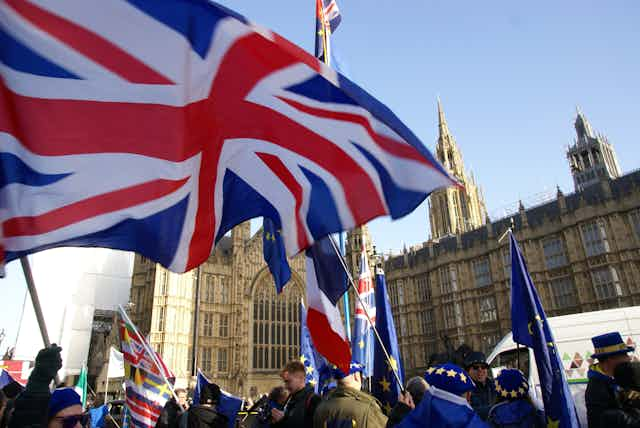It’s very difficult to say what’s going to happen with Brexit right now. The prime minister, Boris Johnson, has said he’d rather “die in a ditch” than ask for a Brexit delay. Yet that’s what MPs are pushing for him to do. And now parliament is suspended for five weeks.
For businesses, this uncertainty over the UK’s future relationship with the EU is taking its toll. But the idea that leaving without a deal on October 31 will end this uncertainty is a false one. It will just make things even more uncertain.
The Bank of England’s latest survey of UK firms details the high level of uncertainty introduced by the Brexit process since the referendum of June 2016. It found that 50% of firms considered Brexit to be one of their top three drivers of uncertainty. It also found that uncertainty has increased substantially after the September 2018 Salzburg summit, when the EU rejected the UK’s Brexit plan and which led to the extension from March 31 to October 31. Moreover, since June 2016 investment fell by 11%, whereas the fall in productivity ranged from 2% to 5%.
On this basis, one could argue that exiting the EU with or without a deal is paramount, as it will settle the matter for the benefit of the British people and companies. While this may be true for people, it will not be the case for business.
A no-deal Brexit means that Britain will revert to WTO rules to trade with the EU and the rest of the world. This means import duties and various controls on trade, which economists at LSE’s Centre for Economic Performance estimate could reduce trade with the EU by as much as 40% over ten years.
This is because some 44% of all UK exports go to the EU and 53% of all UK imports come from the EU, with 30% of UK food coming from the EU. A deal would allow all of this trade to continue freely. As trade deals take years to negotiate, a no-deal Brexit would mean lots more uncertainty ahead.
Financial trouble
An even bigger reason why uncertainty will persist after October 31 if there’s a no-deal Brexit is to do with the UK economy’s reliance on the finance industry. Manufacturing, once a powerful component of the country’s GDP, has fallen to below 9% of UK GDP.
Britain’s financial centre, known as the City of London, is the largest financial hub in the world and employs more than 2.2m people, if you include all the related professions and services that are dependent on the City and spread across the country. The uncertainty affecting financial firms is of a different type than that of other businesses.
The first reason for this is to do with the nature of investment banking and trading of currencies, equities and derivatives. Some £40 to £50 billion of these types of services relate to EU markets, whereas some £55 to £65 billion are truly global and do not depend on the EU. So nearly 50% of trading exchange is conducted in euros and the City of London is the largest hub in the world for euro-trading and various currency swaps.

A no-deal Brexit would mean that the City would – overnight – be subject to restrictions and trade in services would no longer benefit from the free movement principle. Until things settle for Britain’s financial hub, which means consolidating a global and non-EU dependent financial and banking network, uncertainty will persist for the foreseeable future.
Toxic fights
A longer-term issue for the City relates to the protracted friction between it and Brussels over their different approaches to regulation. UK regulations are limited and concern mainly some fundamental ring-fencing legislation, which requires each large UK bank to separate its retail banking activity from the rest of its business. EU regulations, on the other hand, are many and rather rigid, covering market abuse, LIBOR, solvency rules for insurers, payment services – the list goes on.
Hedge funds, although not the bulk of the City’s trade and activity, are extremely hostile to EU regulation because their trading is global, mostly in Asia. And, while the City as a whole aims to diversify trading relations and boost business with Asia, the EU’s aim is to develop its own self-reliant and integrated market, based on large amounts of regulation. This is typical of Germany’s “social market economy” model, which combines free market capitalism with regulation and discipline to ensure fair competition and social policies, and has been transplanted across the EU.
Here lies the reason for toxic fights between the UK and the EU over the “passporting rights” which allow City firms to freely trade their services across the EU. A deal would have meant a transition period where UK firms continue to enjoy these rights and trade could continue without any new barriers.
With no deal in place, the UK will be treated like a non-member. What’s more, new negotiations would have to begin to determine future trade structures. Not only will this take time, it is likely that the EU would force tougher regulation on the UK to regain its free trade in services.
Thus, uncertainty and tension between the UK and the EU will continue in the event of a no-deal Brexit. Meanwhile, it is clear to us that both sides have a vested interest in reaching a deal that respects the UK’s June 2016 referendum result and maintains economic and social stability in the UK and beyond.

